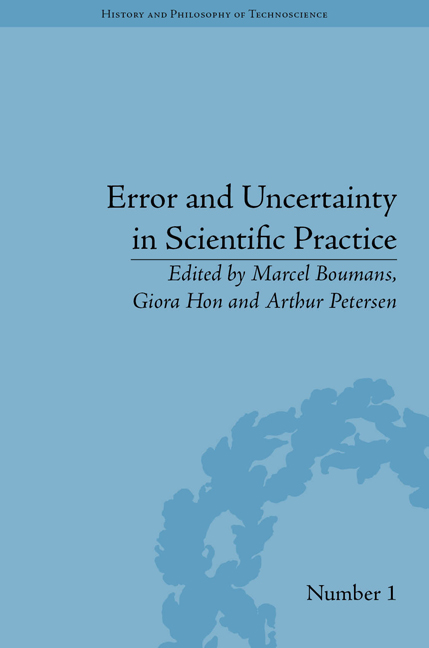Book contents
- Frontmatter
- Contents
- Acknowledgements
- List of Contributors
- List of Figures and Tables
- Introduction
- 1 The Lack of a Satisfactory Conceptualization of the Notion of Error in the Historiography of Science: Two Main Approaches and Shortcomings
- 2 Experimental Knowledge in the Face of Theoretical Error
- 3 Learning from Error: How Experiment Gets a Life (of its Own)
- 4 Modelling Measurement: Error and Uncertainty
- 5 Handling Uncertainty in Environmental Models at the Science–Policy–Society Interfaces
- 6 Variations on Reliability: Connecting Climate Predictions to Climate Policy
- 7 Order and Indeterminism: An Info-Gap Perspective
- 8 Learning from Data: The Role of Error in Statistical Modelling and Inference
- Notes
- Index
7 - Order and Indeterminism: An Info-Gap Perspective
- Frontmatter
- Contents
- Acknowledgements
- List of Contributors
- List of Figures and Tables
- Introduction
- 1 The Lack of a Satisfactory Conceptualization of the Notion of Error in the Historiography of Science: Two Main Approaches and Shortcomings
- 2 Experimental Knowledge in the Face of Theoretical Error
- 3 Learning from Error: How Experiment Gets a Life (of its Own)
- 4 Modelling Measurement: Error and Uncertainty
- 5 Handling Uncertainty in Environmental Models at the Science–Policy–Society Interfaces
- 6 Variations on Reliability: Connecting Climate Predictions to Climate Policy
- 7 Order and Indeterminism: An Info-Gap Perspective
- 8 Learning from Data: The Role of Error in Statistical Modelling and Inference
- Notes
- Index
Summary
Introduction
Order and chaos have impressed themselves on consciousness throughout human history. Modern science attempts to uncover and understand orderliness in creation, leaving tohu vavohu for others to contemplate. In this chapter, we describe a conception of indeterminism – the unknown, the uncertain, the formless and void – that is relevant both to the scientific endeavour and to the practical attainment of reliable decisions in human affairs. Tohu vavohu can be characterized, even understood in some sense, without dispelling the mystery of the unknown.
Indeterminism – the lack of an orderly law-like progression of events – occurs both in the physical world and in human affairs. We will use info-gap theory to characterize this indeterminism and the responses to it.
The prototype of worldly indeterminism is quantum mechanics. Quantum mechanics has enjoyed more than a century of success, explaining black body radiation and the photo-electric effect in the early years, up to nuclear tunnelling, radioactive decay, anti-matter, diode and transistor physics, and more. And yet, quantum mechanics comes at a cost: constriction of the domain of scientific explanation, and weakening of the classical concept of causality. One grain of truth that quantum mechanics captures is that the physical world has an element of irreducible elusiveness, what one might call natural or ontological indeterminism.
Human affairs are full of surprises, and the most important are those that we bring upon ourselves. People make discoveries and inventions.
- Type
- Chapter
- Information
- Error and Uncertainty in Scientific Practice , pp. 157 - 176Publisher: Pickering & ChattoFirst published in: 2014



